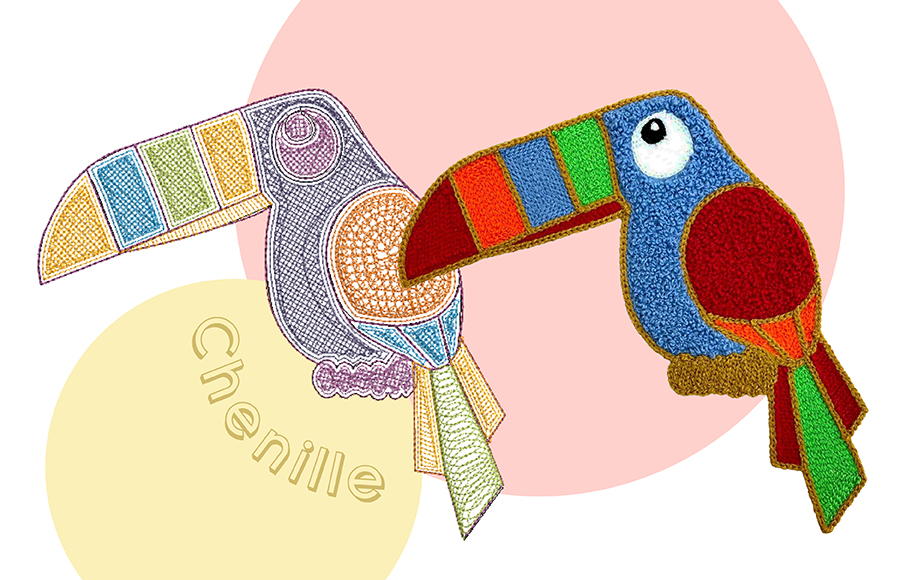
Chenille
and EmbroideryStudio e4.5 Designing
Chenille continues to be a popular technique for specialist embroidery houses with the right equipment.
Traditional chenille embroidery is made with a single, continuous yarn worked into the material and raised in a loop or pile. Commonly recognized by loops of yarn, chenille provides a soft fuzzy carpet-like appearance. Because chenille work is done with yarn instead of thread, it is not generally used for small intricate designs.

Chenille Stitches
Traditional chenille consists of 2 basic stitch types. Moss and Chain stitch.
Moss stitching gives chenille its characteristic look. The loop is used to fill shapes and create a sense of depth. It can produce a wide variety of effects ranging from low, compact to high, plush stitching. In contrast, Chain is generally used for outlines and more delicate work. It is also used to secure or create neat edges for looped moss.


With chenille work, needles have a hook instead of a threaded eye.
Yarn is pulled up one loop at a time by a looper housed below the needle plate. No bobbin is required.
Embroidery Stitch Patterns
The EmbroideryStudio Chenille Element provides a number of stitch patterns typically associated with Chenille work. Coil, Square, Island Coil, and Double Square. These are generally employed with Moss stitch.

Other patterns are available for use with Chain Stitch.

Chenille is a recognizable, unique embroidery technique, and it lends itself to high stitch count designs. The thicker yarn makes it easier to cover larger areas with fewer stitches.
Usages
Chenille designs look best at larger sizes because of yarn thickness and the relative size of moss and chain stitching. Detail can be added by over-sewing with standard embroidery. Chenille sometimes employs multiple strands of yarn for distinctive looks and textures.
It is frequently used for sweatshirt emblems. Usually simple clear shapes. Wilcom’s EmbroideryStudio Chenille Element is often combined with regular embroidery for decorated apparel, such as sports and woolen jackets. It is also widely used with children’s apparel.
Chenille also finds application in custom apparel and fashion markets. Chain stitching provides an interesting alternative to moss for more delicate work.

Chenille has become popular, making its way into department stores just in time for Christmas!

Kids Chenille stick-on letters found in Target stores in Australia
Chenille vs 'faux' chenille
Let’s compare moss stitch in traditional Chenille with the popular ‘faux chenille’ embroidery technique.

Faux chenille is created with exclusive stitch types in EmbroideryStudio e4.5 Designing and embroidered on any standard embroidery machines, without the need for specialized equipment. The chenille loops are mimicked horizontally using thicker yarn, while real chenille loops raise up from the fabric.
True chenille embroidery is made using a single, continuous yarn worked into the material and raised in a loop or pile. Specialized embroidery machine equipment is required. The Chenille backing is usually felt, and softer than regular embroidery backing.

Chenille embroidery is easily achieved with
EmbroideryStudio e4.5 Designing Chenille Element.
EmbroideryStudio Chenille Element
EmbroideryStudio Chenille is object-based which makes design scaling easy. Enlarge or reduce designs and the program automatically recalculates and regenerates stitching. You can also control needle height, corners, stitch length, and much more.
Importantly, the Chenille Element includes professionally digitized Chenille Letters, shown in your font library by the pre-fix ‘CH’.

See it in action!
Download the EmbroideryStudio’s Chenille Supplement
